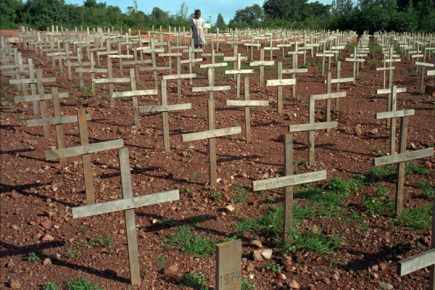
LILONGWE, Malawi – Police in southern African nation of Malawi have arrested a Rwandan national Vincent Murekezi who was convicted on genocide charges in absentia.
A magistrate court sitting in Malawi capital, Lilongwe has ruled that Murekezi should be remanded at Maula Prison as he awaits trial that may result in his extradition.
The arrest comes after Rwanda has been pushing for his extradition since 2009.
Murekezi was found guilty of crimes related to the 1994 genocide and subsequently sentenced to life imprisonment, but strangely he was allowed to live in Malawi freely and openly for years.
Reports also suggest that Murekezi was able not only to acquire business licences, but also secure a Malawian citizenship and a passport.
Murekezi is likely going to challenge his extradition.
While at the moment he is using Malawi passport number MA078171 obtained in 2011, his Rwandan passport number PC939663 indicates that his birthplace is Ngoma-Huye in Rwanda.
The same information appears in a Rwandan government record which names him a suspect of the 1994 genocide.
The genocide.
The “Rwandan Genocide” refers to the 1994 mass slaughter in Rwanda of the ethnic Tutsi and politically moderate Hutu peoples.
The killings began in early April of 1994, and continued for approximately one hundred days until the “Hutu Power” movement’s defeat in mid-July.
The genocide was carried out primarily by Hutu supremacist militia groups, co-perpetrated by the state government of Rwanda, the Rwandan Army, and Rwandan civilians in compliance with the “Hutu Power” movement.
Luke Walker of the Center for Holocaust and Genocide Studies in one of his research reports said by the end of the genocide, at least 500,000 ethnic Tutsis were murdered, along with thousands of Tutsi sympathizers, moderate Hutus, and other victims of atrocity.
Some estimates claim that between 800,000-1,000,000 were killed while about two million refugees fled to neigbouring Burundi, Tanzania, Uganda, and the DR Congo.
Three month massacres
The Rwandan genocide took place over a time span of only 100 days, between April and July 1994.
Hutu nationalist group Parmehutu led a social revolution which overthrew the Tutsi ruling class, resulting in the death of around 20,000 Tutsis and the exile of another 200,000 to neighboring countries. Rwandan independence from Belgium would follow in 1961, marking the establishment of a Hutu-led Rwandan government.
History has it that the Tutsis remaining in Rwanda, mostly due to intermarriage or other family ties, were discriminated against as racially “lesser” citizens by the new Hutu government.
Such political discrimination led to the formation of the Rwandan Patriotic Front in 1985 as a political group of Tutsi nationalist exiles who demanded the right to return to their homeland as citizens and an end to the discrimination.
The RPF rebels invaded Rwanda in October of 1990, re-igniting Tutsi hatred throughout Rwanda. It was this act of Tutsi aggression, coupled with decades of discrimination and fear for a loss of power, that paved the way to genocide.
According to Walker, most of the killings were carried out by two Hutu radical militant groups: the Interahamwe and the Impuzamugambi. Armed, backed, and led by the government of Rwanda (MRND), the Interahamwe were notoriously known for fuelling the genocide.
It is alleged that the genocide was supported by the Hutu-led government and Rwandan military which armed and directed militias.
Disastrous response
The Rwandan genocide happened when the entire world was fully aware of it.
Mark Doyle, a reporter for the BBC in Kigali, tried to explain the situation to the world in late April 1994 as follow:
“…you have to understand that there are two wars going on here. There’s a shooting war and a genocide war. The two are connected, but also distinct. In the shooting war, there are two conventional armies at each other, and in the genocide war, one of those armies, the government side with help from civilians, is involved in mass killings.”
The UN peacekeeping force in Rwanda, UNAMIR, was still on the ground during the genocide.
Over the past years, Rwanda and the international courts have been prosecuting perpetrators of the genocide.
